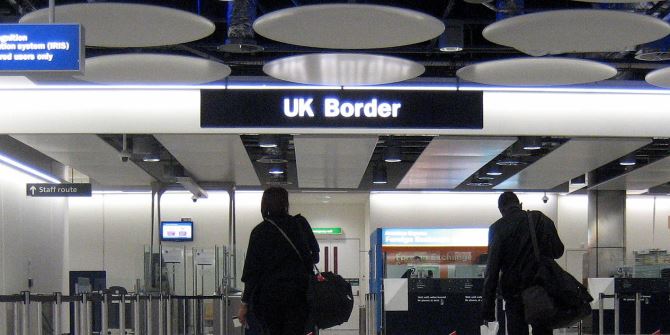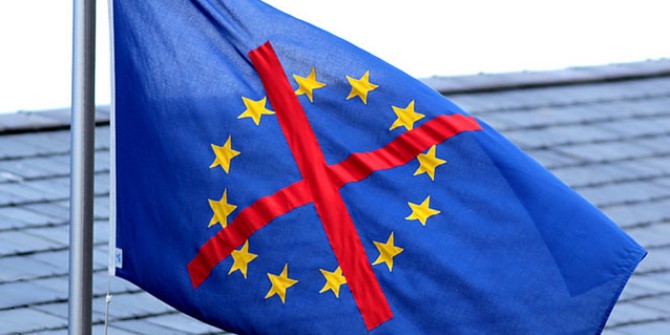 What can the polling tell us about the likely result in the UK’s referendum on EU membership? In an interview with EUROPP’s editor Stuart Brown, Gideon Skinner, Head of Political Research at Ipsos MORI, discusses the recent trends in British public opinion, the potential for David Cameron’s intended renegotiation to shape the outcome, and why despite current support for EU membership the situation could change in a short space of time.
What can the polling tell us about the likely result in the UK’s referendum on EU membership? In an interview with EUROPP’s editor Stuart Brown, Gideon Skinner, Head of Political Research at Ipsos MORI, discusses the recent trends in British public opinion, the potential for David Cameron’s intended renegotiation to shape the outcome, and why despite current support for EU membership the situation could change in a short space of time.
The UK is due to hold a referendum on its EU membership before the end of 2017. Given there is still some time until the referendum will be held it is impossible to predict the outcome at this stage, but what does the trend in recent opinion polls on the subject tell us?
There are probably two things that stand out most from the recent trends. The first is that the trend in the polling is clearly toward support for the UK staying in the EU. Our most recent poll published on 19 June had the highest level of support for EU membership since 1991, with 61 per cent saying they would vote to stay in the EU in a referendum. And that’s been going up for the last 3 or 4 years, which has been seen in other polls as well. So there’s a clear trend even before the general election campaign of increased support for EU membership.
Having said that, the other thing which is noticeable from our polls going back to the 1970s is that opinions on Europe can change quite a lot in a short space of time. It wasn’t that long ago, in October 2011, that the ‘outs’ were in the lead. This was at a time when the Eurozone crisis was very much in the headlines so clearly events can have an impact on people’s opinions. It’s important to emphasise therefore that the British are not consistently in favour of Europe: they have been more often than not during our polling on the subject, but it does change.
Beyond the broad trends in support for staying and leaving are there any other elements, such as David Cameron’s intended renegotiation, which could play a role in the outcome?
I think the most obvious answer to that is to look at the data from when we move away from asking a simple ‘in’ or ‘out’ question to one that’s a little bit more nuanced. We often give people a four-part question where respondents are asked if they prefer closer integration, the relationship to stay as it is, for Britain to be part of an economic community without political links, or for the UK to leave the EU altogether. And when we ask this question we find that the percentage of those who advocate leaving the EU falls – in our most recent poll it was only 13 per cent.
However the most popular individual option out of those choices is consistently the UK being part of an economic community without political links. So we know that the British are not particularly in love with the EU as it is and there is a sense of support for the idea that our relationship with Europe should be changed or renegotiated in some way, with a reduction of powers. That support is not total, but there is some evidence that the public would be open to that principle.
Now obviously much of this will depend on how a renegotiation is presented in the actual campaign itself: will the renegotiation be viewed as something substantive; how will the media portray it; how will politicians speak about it on both sides. But if it is presented in the correct way then there is reason to believe that it would appeal to at least part of the British public.
Does splitting support for staying/leaving along party lines give any insight into how the referendum campaign might go?
Broadly speaking there is a majority for staying in the EU among supporters of every major political party with the exception of UKIP. Conservative supporters are the most likely to say that they support an economic community without political links in the question mentioned above and therefore it would be reasonable to say that David Cameron’s plan for a renegotiation plays particularly well among his own party’s supporters.
UKIP are the key exception and, perhaps unsurprisingly, almost every UKIP supporter we asked said that they would vote to leave the EU in a referendum. One thing that is interesting to note from the trends is that in precisely the same period where support for EU membership has increased, UKIP has also seen a large increase in its support. So the two trends are not necessarily contradictory. We know that although UKIP supporters clearly have very strong views on Europe, it was their views on immigration that largely explained their backing for UKIP in the general election, although obviously the two issues of Europe and immigration are linked.
One of the key stories in the general election was the failure of the opinion polls to accurately predict how the electorate would vote on Election Day. What have polling companies done to remedy these problems since the election and is it possible polling on the EU referendum could suffer from the same issues?
Well first I have to get in the usual caveat that there were some things that the polls got right! However there are a whole range of reviews being conducted from both individual pollsters and the British Polling Council. I don’t think there’s a definitive answer from us, or more broadly, on what led to inaccuracies in the polling. It’s probably the case that the outcome of those reviews won’t simply provide a single solution, particularly given the variation that we saw between the pollsters during the campaign.
Having said that, one aspect that we’re definitely concentrating on is turnout. For us we were within two percentage points of all the parties with the exception of Labour. We overestimated the Labour support and we think a significant part of this was overestimating the likelihood of Labour supporters turning out to vote. So we’re focusing on potential new ways and techniques to get over the problem we saw where despite Labour supporters indicating they were more likely to vote, the turnout between 2010 and 2015 didn’t actually change a great deal.
It’s easy to see how there could be a similar issue with something like an EU referendum where we don’t know what the turnout is likely to be. It was obviously very high in Scotland during the independence referendum in 2014, but the turnout in the Alternative Vote referendum was very low in comparison, while European Parliament elections typically experience much lower levels of turnout than general elections. So getting turnout right seems to be one of the most important challenges for pollsters going forward given that it differs significantly among different groups.
Note: This article was originally published on our sister site, the LSE’s EUROPP blog. Featured image: Meeting between Martin Schulz and David Cameron on 18 June 2015, Credit: Martin Schulz (CC-BY-SA-ND-NC-3.0)
 Gideon Skinner is Head of Political Research at Ipsos MORI.
Gideon Skinner is Head of Political Research at Ipsos MORI.







